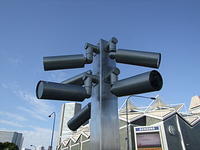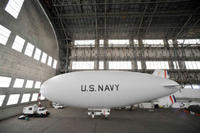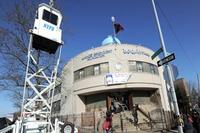-
2008 drone killing of al Shabab leader used phone info collected by NSA
Court documents filed in the case of Basaaly Moalin, a San Diego cab driver of Somali origin accused of aiding al Shabab, reveal that the 2008 killing by a CIA drone strike of al Shabab leader Aden Hashen Ayrow was aided by information collected by the NSA metadata collection program. The NSA was able to pinpoint Ayrow’s real-time location by tracking calls between him and Moalin. Lawyers for Moalin are appealing the conviction on grounds that he was unconstitutionally targeted by the NSA’s surveillance program.
-
-
MI6 asks for more spies in Afghanistan to fight terrorism after NATO withdrawal
MI6, the U.K. Secret Intelligence Service, is calling for reinforcements from other agencies in order to strengthen the U.K. intelligence presence in Afghanistan after NATO forces withdraw from the country in 2014. Intelligence analysts warn that Afghanistan will become an “intelligence vacuum” which will allow terrorists to pose an increased threat to Britain. Intelligence sources said that Britain’s intelligence agencies were already “very stretched” and focused on potential threats from Yemen and Somalia, a fact which might persuade al Qaeda to seek to exploit the lack of attention to Afghanistan.
-
-
Police departments adopt sophisticated, cheap-to-operate surveillance technology

Advancements in surveillance technology have been adopted not only by the National Security Agency (N.S.A) or other federal intelligence agencies. Local police departments have also incorporated the latest surveillance technologies into their work, allowing them to track individuals for different purposes.
-
-
Backlash: growing interest in counter-surveillance tools
The revelations about the NSA surveillance programs has prompted what some see as high-tech civil disobedience: a growing number of products and applications aiming to limit the NSA’s ability to access encrypted e-mails, obtain phone records, and listen to phone conversations.
-
-
Turkey exposed Israeli spy network in Iran
Israel and Turkey used to be close allies, but the relationship began to deteriorate in 2003, when Recep Tayyip Erdogan became prime minister after his Islamic party won the parliamentary elections the year before. The relationship reached its low point in 2010, when nine Turks were killed by Israeli commandos on a ship carrying supplies to the Gaza Strip. This was also the year that Hakan Fidan became the head of Milli Istihbarat Teskilati, or MIT, the Turkish intelligence service. Fidan is known for advocating a closer Turkey-Iran relationship – the Wall Street Journal wrote that “he rattled Turkey’s allies by allegedly passing to Iran sensitive intelligence collected by the U.S. and Israel.” Stories now emerge that in early 2012 Turkey deliberately blew the cover of an Israeli spy ring working inside Iran to collect information on Iran’s nuclear program.
-
-
Director of U.K. intelligence spiritedly defends surveillance programs
The chief of MI5, Britain’s domestic intelligence agency, said last week that recent leaks of government surveillance capabilities had given “the advantage to the terrorists.” Andrew Parker said that “What we know about the terrorists, and the detail of the capabilities we use against them, together represent our margin of advantage. That margin gives us the prospect of being able to detect their plots and stop them. But that margin is under attack.”
-
-
Web sites secretly track users without relying on cookies
Device fingerprinting, also known as browser fingerprinting, is the practice of collecting properties of PCs, smartphones, and tablets to identify and track users. For the vast majority of browsers, the combination of these properties is unique, and thus functions as a “fingerprint” that can be used to track users without relying on cookies. Researchers have discovered that 145 of the Internet’s 10,000 top Web sites use device fingerprinting to track users without their knowledge or consent.
-
-
Virginia police built massive data base of political rallies participants
From 2010 until last spring, the Virginia State Police (VSP) used automatic license plate readers (ALPRs) to collect information about – and build a massive data base of — political activities of law-abiding people. The VSP, for example, recorded the license plates of vehicles attending President Obama’s 2009 inauguration, as well as campaign rallies for Obama and vice presidential candidate Sarah Palin. Following a strong opinion by Virginia Attorney General Ken Cuccinelli, the VSP discontinued the practice, and the agency says it has purged its license plate database, and now disposes of ALPR-obtained information within twenty-four hours of collection, unless it is relevant to a clearly defined criminal investigation.
-
-
U.S. keeping too much data on too many people for too long: report
A new study surveys five methods of data collection by U.S. intelligence and law enforcement agencies, and finds that these agencies not only collect massive amounts of innocent Americans’ data, but can share and store this data for up to seventy-five years or more, creating opportunities for abuse and clogging government databases.
-
-
NSA tried to crack Tor anonymity tool
In its efforts to gather more intelligence, and overcome obstacles to this effort, the National Security Agency (NSA) has repeatedly tried to develop attacks against people using Tor, a software tool designed to protect online anonymity – and which is primarily funded and promoted by the U.S. government itself to help political activists, whistleblowers, militaries, and law enforcement. The NSA’s determined effort to crack Tor raises questions about whether the agency, deliberately or inadvertently, acted against Internet users in the United States when attacking Tor. One of the main functions of Tor is to hide the country of all of its users, meaning any attack could be hitting members of Tor’s large U.S. user base.
-
-
More Americans see their electronic equipment seized by DHS at the border
The American Civil Liberties Union (ACLU) has released details of an investigation showing how U.S. law enforcement and other agencies exceed their powers in the name of homeland security. The ACLU points to the practice of the U.S. border agents searching and seizing the electronic devices of Americans at the border. Public data shows that more Americans are having their electronic devices searched.
-
-
Navy blimp conducts aerial mapping operations in the Washington D.C. Flight Restriction Zone

The U.S. Naval Research Laboratory (NRL) and the Navy’s sole Science & Technology research squadron, Scientific Development Squadron ONE (VXS-1), began operating the MZ-3A lighter-than-air blimp in the regions surrounding Washington, D.C. on 21 September. The Navy MZ-3A is conducting aerial mapping operations within the Washington D.C. Flight Restriction Zone (DCA-FRZ).
-
-
Using spooks’ software to select wine
Delectable is a mobile application that allows users to explore wines by using technology currently employed to locate terrorists and prevent bank frauds. The application is considered to have the world’s largest database of wine, providing information on more than two million wines and offering users an option to purchase selected wines.
-
-
U.S. pays growing attention to insider threats
Al Qaeda and other terrorist organizations have repeatedly sought to infiltrate the U.S. intelligence community by having supporters apply for intelligence jobs, according to a classified budget document. The U.S government investigates thousands of employees a year to make sure such infiltration does not happen. The CIA says that 20 percent of job applicants whose backgrounds raised questions had “significant terrorist and/or hostile intelligence connections.”
-
-
NYPD designated all NYC mosques as terrorist organizations to facilitate broad surveillance

The New York Police Department (NYPD) secretly labeled entire mosques in New York as terrorist organizations, allowing the NYPD to use surveillance techniques including informants and spies without needing evidence or proof of criminal or terrorist activities to investigate the mosques. The investigations, known as Terrorism Enterprise Investigations (TEI), began after the 9/11 attacks on New York City and the Pentagon.
-
- All
- Regional
- Water
- Biometrics
- Borders/Immig
- Business
- Cybersecurity
- Detection
- Disasters
- Government
- Infrastructure
- International
- Public health
- Public Safety
- Communication interoperabillity
- Emergency services
- Emergency medical services
- Fire
- First response
- IEDs
- Law Enforcement
- Law Enforcement Technology
- Military technology
- Nonlethal weapons
- Nuclear weapons
- Personal protection equipment
- Police
- Notification /alert systems
- Situational awareness
- Weapons systems
- Sci-Tech
- Sector Reports
- Surveillance
- Transportation
Advertising & Marketing: advertise@newswirepubs.com
Editorial: editor@newswirepubs.com
General: info@newswirepubs.com
2010-2011 © News Wire Publications, LLC News Wire Publications, LLC
220 Old Country Road | Suite 200 | Mineola | New York | 11501
Permissions and Policies
Editorial: editor@newswirepubs.com
General: info@newswirepubs.com
2010-2011 © News Wire Publications, LLC News Wire Publications, LLC
220 Old Country Road | Suite 200 | Mineola | New York | 11501
Permissions and Policies
